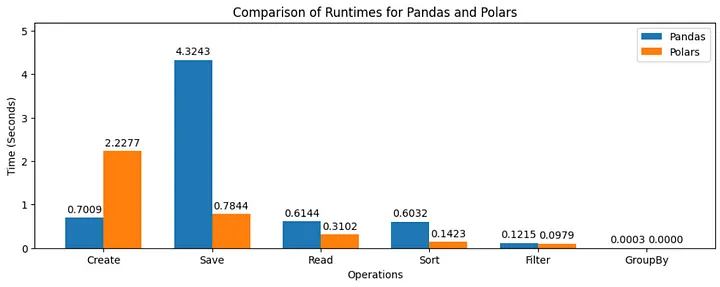Polars

An alternative to pandas
The advantages of polars can be directly seen in the image above. It is clear from the graph that Polars perform faster than Pandas for most operations. This is particularly true for the GroupBy operation, where Polars is nearly 20 times faster than Pandas. The Filter operation is also significantly faster in Polars, while Create operations are somewhat faster in Pandas. Overall, Polars seems to be a more performant library for data manipulation, particularly for large datasets.
Syntax example
import polars as pl
q = (
pl.scan_csv("docs/data/iris.csv")
.filter(pl.col("sepal_length") > 5)
.group_by("species")
.agg(pl.all().sum())
)
df = q.collect()
Ding, Yuheng, Yusong Wang, Bo Qiang, Jie Yu, Qi Li, Yiran Zhou, and Zhenmin Liu. 2025. “NaFM: Pre-Training a Foundation Model for Small-Molecule Natural Products.” https://doi.org/10.48550/ARXIV.2503.17656.
Guo, Jeff, and Philippe Schwaller. 2024. “It Takes Two to Tango: Directly Optimizing for Constrained Synthesizability in Generative Molecular Design.” arXiv. https://doi.org/10.48550/ARXIV.2410.11527.
Landrum, Gregory A., Jessica Braun, Paul Katzberger, Marc T. Lehner, and Sereina Riniker. 2024. “Lwreg: A Lightweight System for Chemical Registration and Data Storage.” Journal of Chemical Information and Modeling 64 (16): 6247–52. https://doi.org/10.1021/acs.jcim.4c01133.
Orsi, Markus, and Jean-Louis Reymond. 2024. “One Chiral Fingerprint to Find Them All.” Journal of Cheminformatics 16 (1): 53.